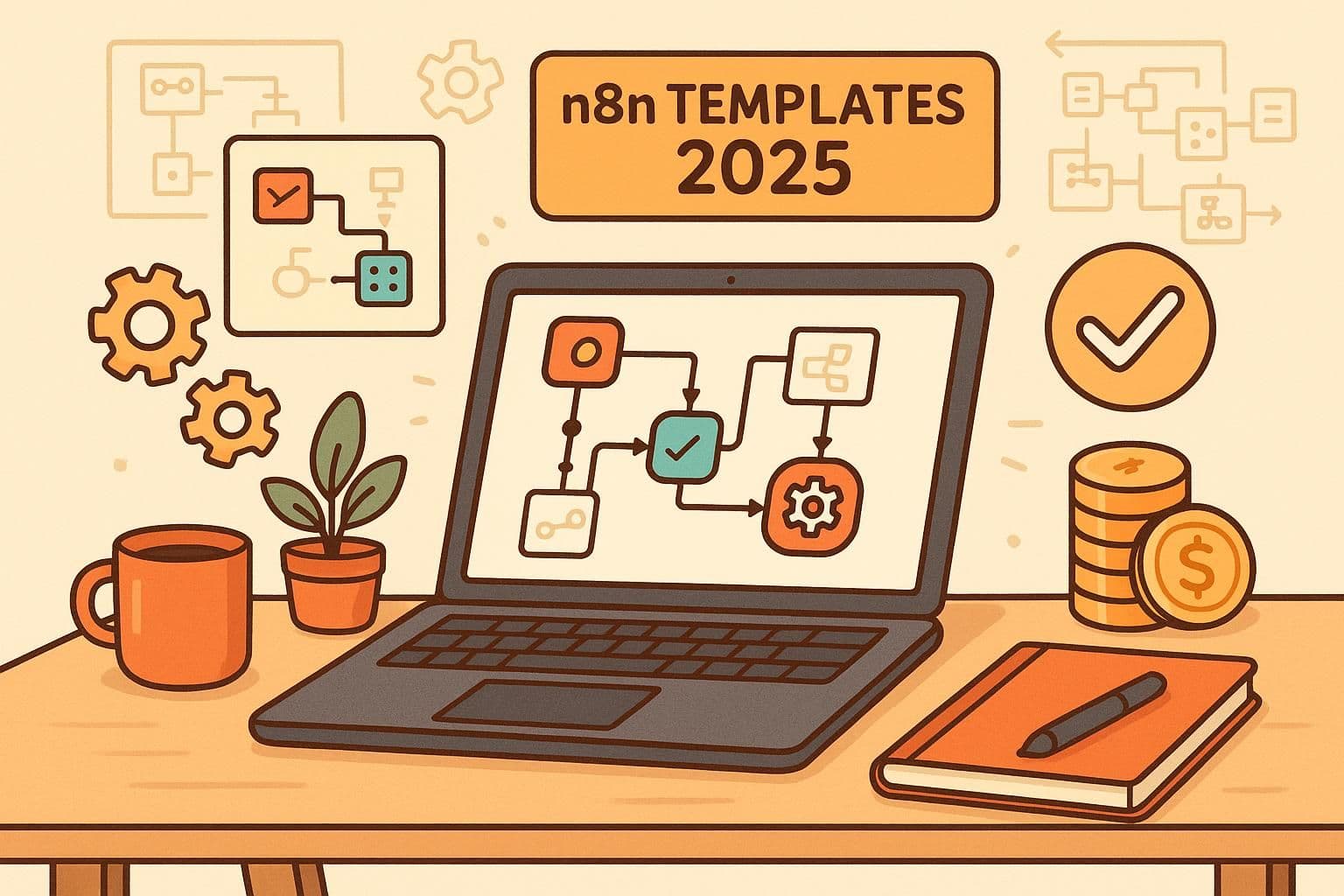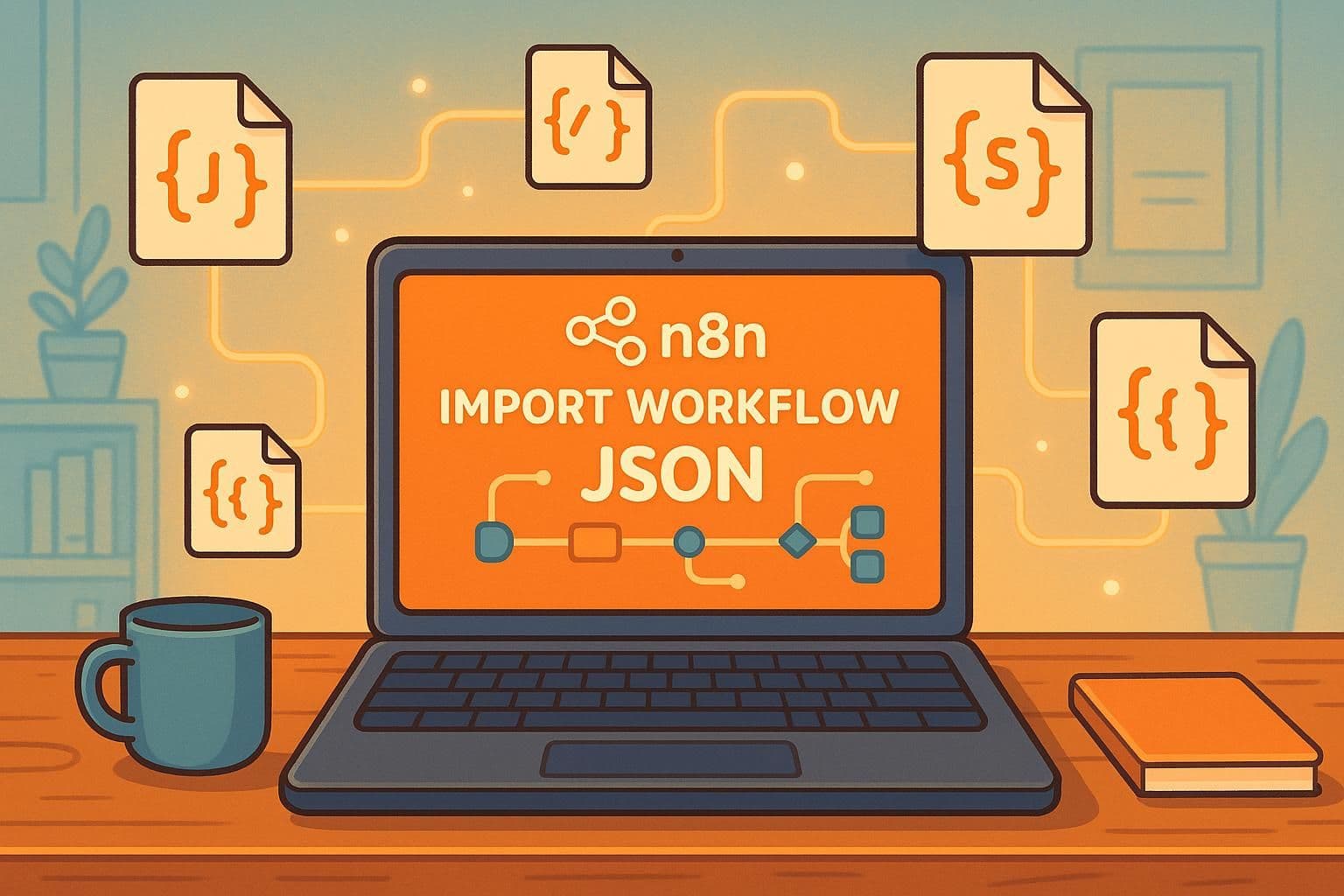N8N Templates 2025: 20 Free Downloads + Template Quality Analysis & Better Alternatives
Explore the pros and cons of N8N community and Latenode professional templates for automation, uncovering efficiency, reliability, and hidden costs.

N8N templates are pre-built automation workflows designed to simplify tasks like CRM integration, e-commerce management, and data analysis. With over 5,000 templates available in 2025, they offer a quick start for automating business processes. However, 70% of these templates fail during implementation due to outdated dependencies, poor documentation, or lack of testing, often requiring over 20 hours of technical adjustments.
For businesses seeking reliable automation, Latenode's professional templates provide a dependable alternative. They feature detailed documentation, proactive updates, and seamless integration with 300+ apps. Starting at $19/month, Latenode eliminates the hidden costs of troubleshooting and ensures workflows remain operational, making it a smart choice for critical tasks. Whether you're managing CRM processes or automating e-commerce, Latenode reduces setup time while offering technical support to ensure smooth deployment.
How to Use Free n8n Templates Without Breaking Everything – Beginner Tutorial
1. N8N Community Templates
Community-driven n8n templates are designed to act as starting points rather than fully functional solutions. The quality and level of documentation within this extensive collection can vary widely, making them a mixed bag for users.
Documentation Standards and Maintenance Challenges
The n8n community template library primarily serves as a resource for examples rather than ready-to-deploy workflows [6]. Templates like Lucas Peyrin's "🎓 Learn API Fundamentals with an Interactive Hands-On Tutorial Workflow" and other educational examples often provide only basic setup instructions. Users typically need a solid grasp of technical concepts to adapt these workflows effectively to their needs [7].
Another challenge is the irregular maintenance of these templates. While some popular options receive occasional updates, others remain stagnant for long periods. This inconsistency can lead to compatibility issues when n8n introduces updates, leaving users to troubleshoot and adapt templates on their own. These gaps in documentation and maintenance often result in higher customization demands, which are explored further in the next section.
Customization and Technical Knowledge
Using community templates effectively often requires a strong technical foundation. Templates containing "Code" nodes demand JavaScript proficiency, and even simpler workflows require familiarity with API basics, JSON structures, and n8n's visual programming interface [7].
Customization involves configuring nodes, understanding how they interact, and ensuring smooth data flow between services. For example, a CRM integration template might need adjustments to HTTP Request nodes, changes in data transformation logic, and updates to authentication settings to align with a specific CRM platform. These adjustments can lead to unexpected challenges during deployment, especially for users without advanced technical expertise.
Practical Implementation Insights
Community feedback highlights a recurring issue: the gap between a template's tutorial promise and its performance in real-world scenarios. While templates might work as intended under controlled conditions, they can encounter problems when faced with varying data volumes, differing API versions, or unique integration setups. Since quality control often relies on user feedback rather than systematic testing, inconsistencies are common.
Many users find that significant customization is required to turn these free templates into solutions suitable for business use. This customization often introduces hidden costs in terms of time and effort. Recognizing these limitations is essential when weighing the benefits of community templates against professionally maintained alternatives. This variability creates a natural transition to exploring how professionally supported solutions compare.
2. Latenode Professional Templates
Professional platforms address common community template challenges by ensuring consistent quality control, detailed documentation, and routine maintenance. Latenode's template ecosystem exemplifies how professionally managed workflows deliver greater dependability and smoother deployment. This sets the foundation for the robust documentation discussed below.
Documentation Quality and Maintenance Standards
Latenode provides enterprise-level documentation, which includes detailed step-by-step instructions, configuration examples, and troubleshooting guides. Each template undergoes rigorous testing to ensure compatibility with platform updates, so your workflows remain operational as the automation platform evolves.
A proactive update strategy ensures that API changes in connected services like Google Sheets, Stripe, or Notion are addressed before they cause disruptions. This approach minimizes the risk of templates becoming outdated or breaking due to API version mismatches.
Implementation Success Rates and Customization Requirements
These high standards directly improve implementation speed and reliability. Latenode's professional templates typically require far less customization compared to community-generated alternatives. With features like pre-configured settings, built-in error handling, and ready-to-use data transformation nodes, users can deploy workflows in hours instead of spending days troubleshooting or reconfiguring.
The platform's extensive library supports over 300 app integrations, maintaining consistent quality across a variety of use cases. Whether you're automating CRM processes, managing e-commerce workflows, or handling AI-driven content operations, Latenode templates follow standardized structures designed to reduce learning curves and simplify setup.
Cost Analysis: Hidden Expenses vs. Transparent Pricing
While free templates might seem appealing, they often come with hidden costs, such as the time and effort required for extensive customization. Latenode eliminates these uncertainties with a clear pricing model. Starting at $19 per month for the Start plan, users gain 5,000 execution credits and full access to the template library. This transparent pricing structure helps you avoid the unpredictable expenses often associated with community templates, providing a scalable solution that grows alongside your automation needs.
Technical Support and Business Continuity
Dedicated technical support is another key advantage of Latenode. Users benefit from comprehensive documentation, responsive support channels, and access to platform experts. This contrasts with community forums, where response times and solution quality can be inconsistent.
For workflows that are critical to your operations, ensuring business continuity is a priority. Latenode's enterprise plans include dedicated support and service commitments, making it an ideal choice for processes where downtime could result in significant financial impacts.
sbb-itb-23997f1
Advantages and Disadvantages
This section dives into the trade-offs between community-driven and professional template ecosystems, both of which can significantly influence automation success and the long-term viability of projects.
N8N Community Templates: The Free but Complex Route
Community templates provide an appealing starting point with zero upfront cost and open-source flexibility, allowing for extensive customization. User ratings can also help highlight templates that have worked well for others.
However, these benefits come with challenges. Documentation is often inconsistent, and many templates lack even basic setup instructions, leaving non-technical users struggling to troubleshoot effectively [1][2]. On average, technical teams may spend 10 to 20 hours - or more - adapting these templates to meet specific needs. Moreover, disclaimers in many community repositories warn that templates might be incomplete, requiring further user input for debugging or completion [3][4].
These limitations highlight the importance of evaluating professional templates, where reliability and support take center stage.
Latenode Professional Templates: Reliability at a Premium
Unlike the unpredictable nature of community templates, professional platforms like Latenode offer a structured and dependable alternative. Templates undergo rigorous quality checks, compatibility testing, and receive regular updates to stay aligned with evolving services.
Professional templates boast a much higher success rate - typically 80% to 95% - compared to the 30% to 50% reliability seen with community templates. For instance, a logistics company successfully implemented Latenode’s order processing template in under two hours. The ongoing support ensured compatibility after platform updates, minimizing downtime during critical operations.
Latenode also provides transparent pricing, starting at $19/month for 5,000 execution credits, which helps businesses avoid hidden costs tied to debugging and maintenance.
Detailed Comparison Analysis
| Factor | N8N Community Templates | Latenode Professional Templates |
|---|---|---|
| Initial Cost | Free download | $19–$299+ monthly subscription |
| Documentation Quality | Variable; often minimal | Comprehensive, standardized guides |
| Customization Time | 10–20+ hours typically | 1–3 hours with guided setup |
| Success Rate | 30–50% reliable on first attempt | 80–95% successful deployment |
| Maintenance Responsibility | User handles updates and fixes | Provider manages compatibility and updates |
| Technical Support | Community forums; no guarantees | Dedicated support channels |
| Security | Not formally vetted | Professionally audited and tested |
| Long-term Reliability | Prone to breakage with updates | Proactive update management |
Hidden Costs and Total Ownership Analysis
While community templates are free to download, the actual costs can quickly add up. Teams often spend over 20 hours per template on debugging and customization, resulting in unpredictable expenses that can strain resources.
Professional platforms like Latenode minimize these hidden costs by offering standardized deployment, ongoing updates, and technical support. The predictable subscription model allows for accurate budgeting, reducing the risk of delays caused by template failures or compatibility problems.
When Each Approach Makes Sense
Community templates are best suited for experimental projects, personal workflows, or cases where technical teams have the expertise to handle customization and maintenance. On the other hand, professional templates are ideal for business-critical automations, time-sensitive deployments, or organizations without dedicated technical resources. In such scenarios, the reliability and support provided by professional templates can prevent workflow disruptions that might otherwise impact revenue or customer satisfaction.
Final Recommendations
When deciding on the best template approach, it’s essential to weigh your technical expertise, business priorities, and budget. The earlier comparisons highlight the trade-offs between free templates and curated solutions, making it easier to align your choice with your specific needs.
For developers with strong technical expertise and flexible timelines, free N8N templates can be a practical option for non-critical projects. With a vast community library, you’ll find workflows tailored to areas like AI, finance, and DevOps [3][5]. This approach allows for experimentation and exploration without upfront costs, though it may require significant time for customization and troubleshooting.
For mission-critical automations, professionally curated templates from Latenode stand out as the more dependable choice. These solutions minimize the risks of workflow failures that could disrupt operations, affect revenue, or harm customer trust. Expert support and reliable performance make them ideal for businesses prioritizing stability.
Budget Considerations: Latenode offers plans starting at $19/month for 5,000 execution credits, providing predictable costs. This eliminates the unpredictable time and effort often required to adapt and maintain community templates, making it a worthwhile investment for many businesses.
Hybrid Approach: For those seeking a balance, consider prototyping with free templates to test ideas and then transitioning critical workflows to Latenode. This strategy combines the cost-efficiency of free resources with the reliability and support of a managed platform.
Security and Compliance Requirements: Companies managing sensitive data should lean toward professionally audited templates. Unlike community-driven options, Latenode ensures thorough quality checks and security reviews, offering peace of mind for organizations with stringent compliance needs.
Ultimately, the choice hinges on whether you prioritize the no-cost flexibility of free templates or the reliability and professional support of a managed platform. For many businesses, the reduced maintenance effort and confidence in secure, well-tested workflows make Latenode a compelling solution.
FAQs
What makes Latenode's professional templates better than community n8n templates?
Latenode's templates offer a professional edge, characterized by their exceptional quality, comprehensive documentation, and thorough testing processes. These attributes significantly reduce the likelihood of implementation challenges and minimize the time spent on debugging. In contrast to community-driven options like n8n templates, Latenode ensures its templates are professionally managed with automatic updates. This proactive approach keeps them aligned with platform updates, saving businesses both time and effort.
Moreover, Latenode delivers dedicated support and guarantees that its templates are secure, dependable, and primed for business use. By addressing potential hidden costs such as troubleshooting, customization, and ongoing maintenance, Latenode provides a streamlined and cost-efficient solution for meeting automation requirements.
How does Latenode guarantee the reliability and upkeep of its automation templates?
Latenode ensures the dependability of its automation templates through thorough professional testing and automatic updates that keep pace with platform changes. These templates are designed with precision to minimize potential errors and cut down on the time spent troubleshooting.
To further streamline the experience, Latenode offers continuous support and conducts compatibility checks to ensure templates remain operational and aligned with user requirements. This approach helps businesses save valuable time and effort on maintenance.
What should businesses consider when choosing between free N8N community templates and Latenode’s professional templates for automation?
When choosing between free N8N community templates and Latenode’s professional templates, it’s important to weigh reliability, documentation quality, and maintenance demands. While community templates are available at no cost, they often come with limitations like incomplete documentation, minimal testing, and a lack of ongoing support. These gaps can lead to increased time spent on customization and debugging, particularly when platform updates occur.
On the other hand, Latenode offers professionally developed templates designed with automatic updates, extensive testing, and straightforward customization. These features help minimize technical challenges, save valuable time, and support smoother growth. For businesses tackling critical or large-scale automation projects, opting for professional templates can provide greater dependability and long-term value compared to free options.
Related Blog Posts



